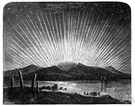Au·ro·ra 1
(ə-rôr′ə)n. Roman Mythology
The goddess of the dawn.
[Latin Aurōra; see aurora.]
Au·ro·ra 2
(ə-rôr′ə)1. A city of north-central Colorado, a residential suburb of Denver.
2. A city of northeast Illinois on the Fox River west of Chicago. It developed as an industrial center.
au·ro·ra
(ə-rôr′ə)n. pl. au·ro·ras or au·ro·rae (ə-rôr′ē)
1. A luminous atmospheric phenomenon appearing as streamers or bands of light sometimes visible in the night sky in northern or southern regions of the earth. It is thought to be caused by charged particles from the sun entering the earth's magnetic field and stimulating molecules in the atmosphere.
2. The dawn.
au·ro′ral, au·ro′re·an (-ē-ən) adj.
au·ro′ral·ly adv.
American Heritage® Dictionary of the English Language, Fifth Edition. Copyright © 2016 by Houghton Mifflin Harcourt Publishing Company. Published by Houghton Mifflin Harcourt Publishing Company. All rights reserved.
aurora
(ɔːˈrɔːrə)n, pl -ras or -rae (-riː)
1. (Physical Geography) an atmospheric phenomenon consisting of bands, curtains, or streamers of light, usually green, red, or yellow, that move across the sky in polar regions. It is caused by collisions between air molecules and charged particles from the sun that are trapped in the earth's magnetic field
2. poetic the dawn
[C14: from Latin: dawn; see east]
auˈroral adj
auˈrorally adv
Aurora
(ɔːˈrɔːrə)n
1. (Classical Myth & Legend) the Roman goddess of the dawn. Greek counterpart: Eos
2. the dawn or rise of something
Aurora
(ɔːˈrɔːrə)n
(Placename) another name for Maewo
Collins English Dictionary – Complete and Unabridged, 12th Edition 2014 © HarperCollins Publishers 1991, 1994, 1998, 2000, 2003, 2006, 2007, 2009, 2011, 2014
Au•ro•ra
(əˈrɔr ə, əˈroʊr ə)n., pl. au•ro•ras, au•ro•rae (əˈrɔr i, əˈroʊr i)
1. the Roman goddess of the dawn.
2. (l.c.) dawn.
3. (l.c.) a radiant emission from the upper atmosphere that occurs as luminous streamers, bands, etc., caused when air molecules are excited by charged particles from the solar wind.
4. a city in central Colorado, near Denver. 252,341.
5. a city in NE Illinois. 116,405.
[1350–1400; Middle English < Latin: dawn, east]
au•ro′ral, au•ro′re•an, adj.
Random House Kernerman Webster's College Dictionary, © 2010 K Dictionaries Ltd. Copyright 2005, 1997, 1991 by Random House, Inc. All rights reserved.
au·ro·ra
(ə-rôr′ə) Plural auroras or aurorae (ə-rôr′ē)
A brilliant display of bands of light in the sky at night, especially in polar regions. The light is caused by charged particles from the sun that are drawn into the atmosphere by the Earth's magnetic field.
The American Heritage® Student Science Dictionary, Second Edition. Copyright © 2014 by Houghton Mifflin Harcourt Publishing Company. Published by Houghton Mifflin Harcourt Publishing Company. All rights reserved.
aurora
1. An electrical discharge producing curtains of light seen at high latitudes in the night sky.
2. The orthern and southern “polar lights” sometimes seen in Earth’s upper atmosphere and created by solar particles striking atoms.
Dictionary of Unfamiliar Words by Diagram Group Copyright © 2008 by Diagram Visual Information Limited
ThesaurusAntonymsRelated WordsSynonymsLegend:
| Noun | 1. |  aurora - the first light of day; "we got up before dawn"; "they talked until morning" aurora - the first light of day; "we got up before dawn"; "they talked until morning"break of day, break of the day, cockcrow, dawn, dawning, daybreak, dayspring, first light, sunrise, sunup, morning time of day, hour - clock time; "the hour is getting late" |
| 2. |  aurora - an atmospheric phenomenon consisting of bands of light caused by charged solar particles following the earth's magnetic lines of force aurora - an atmospheric phenomenon consisting of bands of light caused by charged solar particles following the earth's magnetic lines of forceatmospheric phenomenon - a physical phenomenon associated with the atmosphere aurora australis, southern lights - the aurora of the southern hemisphere aurora borealis, northern lights - the aurora of the northern hemisphere streamer - light that streams; "streamers of flames" | |
| 3. | Aurora - (Roman mythology) goddess of the dawn; counterpart of Greek Eos Roman mythology - the mythology of the ancient Romans |
Based on WordNet 3.0, Farlex clipart collection. © 2003-2012 Princeton University, Farlex Inc.
aurora
nounThe American Heritage® Roget's Thesaurus. Copyright © 2013, 2014 by Houghton Mifflin Harcourt Publishing Company. Published by Houghton Mifflin Harcourt Publishing Company. All rights reserved.
Translations
revontulet
poollicht